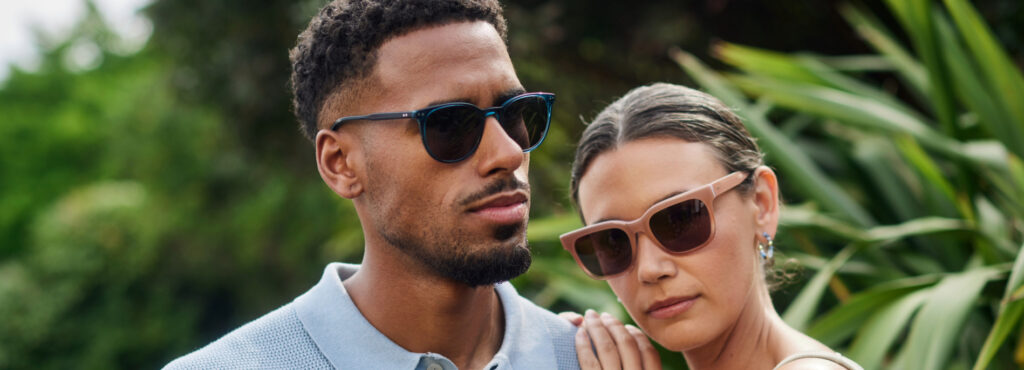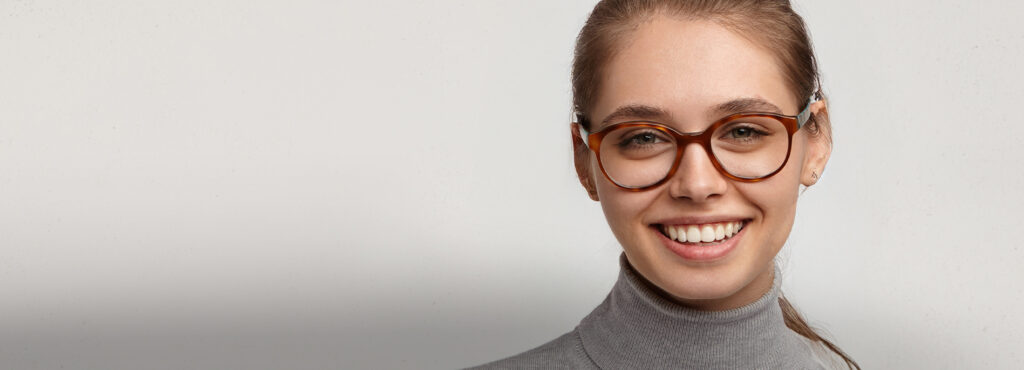It’s that time of year when you’ll be relaxing by the beach, enjoying a picnic in the park, or simply spending more time outdoors in the hot weather. Sunshine is exciting for many of us, but it’s also an important reminder to think about protecting your eyes and skin from the sun. While a little exposure is healthy for providing your body with vitamin D, it’s essential that you take precautions and have the right UV eye protection, ideally a pair of sunglasses, to safeguard your vision and overall healthcare. That’s why we’ve put together some simple, practical top tips to help you stay safe in the sun and enjoy summer days with confidence.
Quick tips to protect your eyes and skin from the sun:
- Wear sunglasses with 100% UV protection
- Choose Transitions® or polarised lenses
- Apply broad-spectrum SPF regularly
- Spend time in the shade between 11am–3pm
- Wear protective clothing and hats
- Stay hydrated and avoid sunbeds

What is Sun Awareness Week?
Sun Awareness Week is a national campaign that runs every year. It raises awareness of the dangers of sun exposure and the effects this can have on your health. The campaign aims to educate people about non-melanoma skin cancer, the risk of skin cancer as result of sun exposure and the importance of carrying out self-checks.

Why is UV protection important for my eyes?
Overexposure to UV rays can have just as much of a negative impact on your eyesight as it can your skin. Ultraviolet light can cause diseases such as cataracts and lead to the development of macular degeneration. To understand more, watch our Ask the Optician video below, which explores the importance of UV protection.

Keep yourself protected with our sun safety tips:
Follow our top tips to keeping yourself safe in the hot weather this summer.
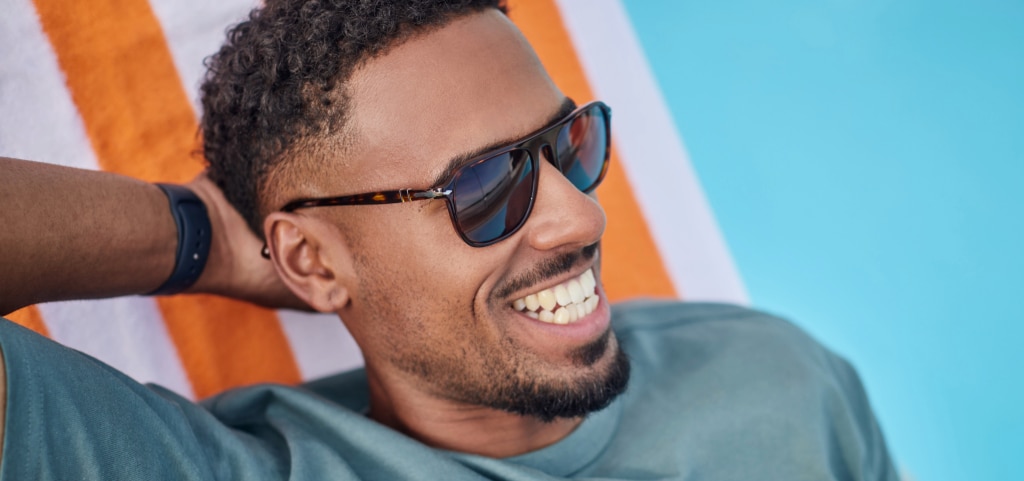
Best sunglasses for UV eye protection
It’s important to wear appropriate eyewear when exposed to the sun’s rays. Ideally, you’ll need large sports sunglasses or a pair with thick temples to guarantee the best level of protection from the sun. Choose designs with a good balance of functionality and style.
At Glasses Direct, all sunglasses’ tints come with 100% UVA and UVB protection. UVA protection safeguards you from eye diseases like cataracts and the development of macular degeneration, while UVB protection helps to prevent snow blindness and certain eyelid tumours. You can choose from dark, gradient, or polarised sunglasses. Transitions® lenses are another convenient option. They adapt to changing light conditions, going from clear indoors to dark outside. These innovative lenses protect you from UV rays and sources of blue-violet light.
We also have a range of sophisticated lens packages. The Gold, Platinum and Diamond packages feature an anti-UV and anti-reflective coating, so you can have a pair of glasses with a built-in UV filter. This will protect against radiation from the sun and reduce problematic reflections and glare. However, we still recommend a pair of sunglasses in very bright conditions to prevent discomfort and eye strain.
Don’t forget: Reflected sunlight from water, sand and snow is still very dangerous. For this reason, wearing UV protection year-round, come rain or shine, is essential. To protect your eyes, you must also avoid looking directly at the sun as this can cause permanent eye damage.
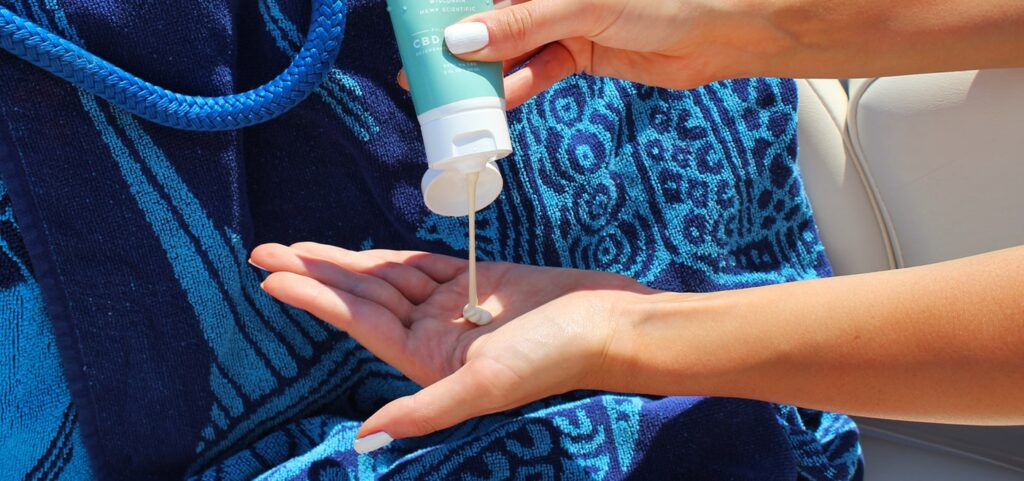
Use sunscreen to protect your skin
Always wear sunscreen when it’s hot. Apply it before you head outside to allow time for it to be absorbed into your skin and to provide effective protection from sunburn. Reapply sun cream every two hours and immediately after swimming, sweating, or using a towel. Even water-resistant sun creams will need to be reapplied regularly.
Your reaction to the sun may vary depending on your skin tone. Those with lighter skin have less melanin and are therefore more susceptible to sunburn and sun damage. Individuals with darker skin have more melanin and so are less vulnerable to these effects. Despite this, it’s still important to avoid overexposure to the sun. Ensure any areas of your skin that might be exposed are well covered with sunscreen.
An important reminder: Sunscreens normally have a Sun Protection Factor (SPF). This number indicates its ability to block the sun’s UV rays. As a rule, the higher the SPF number the better the UV protection. Most people are recommended at least SPF 30 or higher and a star rating of 4 to 5. However, some individuals may choose a lighter formula with SPF 15 for everyday use. Always ensure the sunscreen is broad spectrum, meaning it protects against both UVA and UVB rays, and check that it carries a CE mark for safety standards. If you’re using an old sunscreen from last summer, don’t forget to check the expiry date.
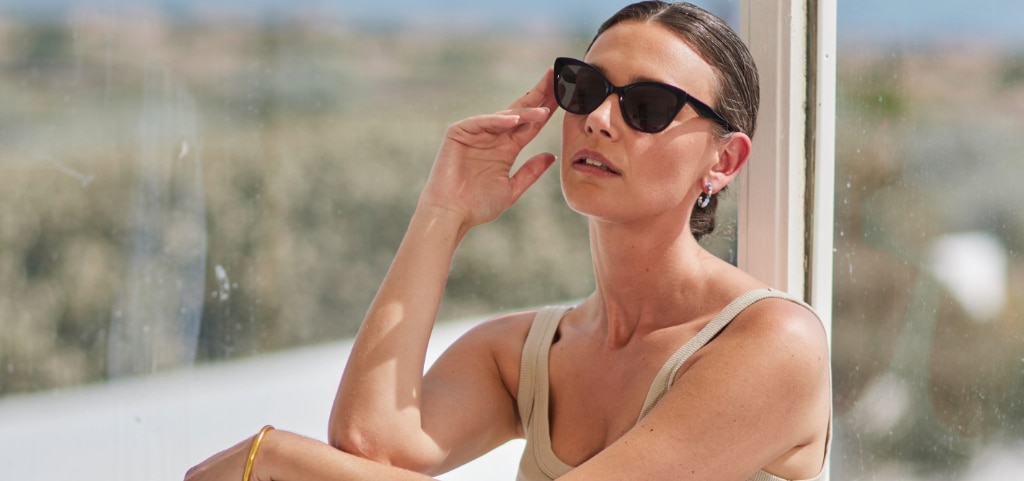
How shade protects your eyes from UV damage
Seeking shade will reduce the risk of sun damage to your eyes, caused by overexposure to UV rays. Stay under an umbrella or find other forms of shelter wherever possible. You can still have plenty of fun and stay safe in the sun whilst avoiding direct sunlight for too long.
The level of UV radiation will vary depending on the season and time of day. The UV Index (UVI) is a well-recognised scale used to measure the intensity of ultraviolet (UV) radiation. It begins at zero and can reach above 10. The higher the index, the greater the risk of skin and eye damage — and the quicker that damage can occur. According to the NHS, you should spend time in the shade between 11am and 3pm as this is when the sun’s rays are strongest, especially from spring to summer.

Hydrate your eyes with artificial tears
The warm weather can dry your eyes out, especially if you’re someone who wears contact lenses or if you suffer from allergies. Make sure you use eye drops regularly to soothe any irritation. Eye drops are designed to replicate natural tears which help to hydrate your eyes.
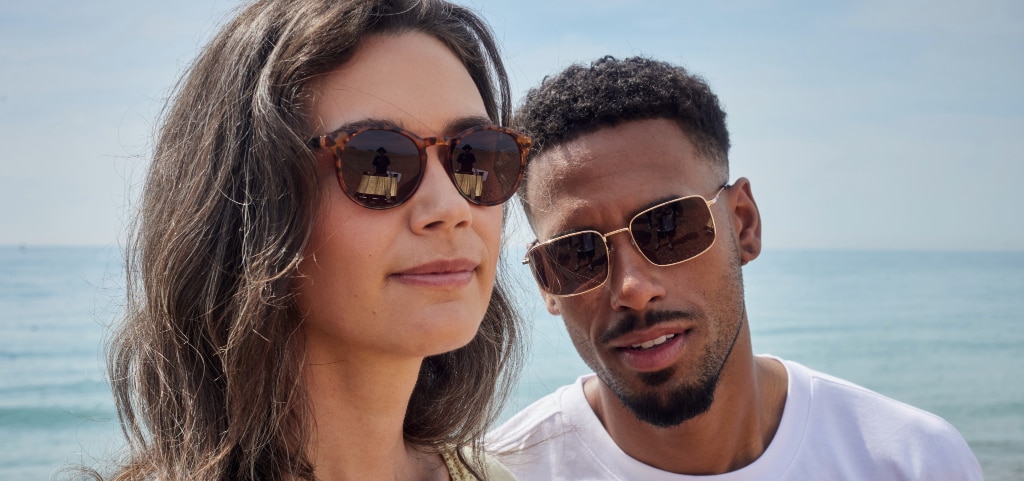
Wear protective clothing in bright sun
Make sure you don’t have any exposed skin. Cover your shoulders, chest and back with a comfortable, loose-fitting t-shirt or long-sleeve top. Dark colours will absorb more UV light than lighter colours. They therefore make it far less likely that the UV rays will reach your skin. Although, lighter colours are ideal if you want to stay cool because they reflect heat. Just don’t forget to apply plenty of sun cream for added sun protection.
Top tip: Avoid sitting in direct sunlight with a wet t-shirt as it offers far less UV protection. Choose soft and breathable fabrics and wear a close-weave straw hat, especially a wide-brimmed hat which will help to shade your face, eyes, ears and the back of your neck.

Drink plenty of water
It may seem like an obvious thing to say, but make sure you’re drinking enough water. Being outside in the sun can make you feel dizzy and thirsty, so be sure to cool yourself down with a cold drink. Just be aware that sugary drinks will not hydrate you in the same way that water does. You should aim to drink around six to eight glasses of water a day. Our advice would be to take a large bottle of water with you and remember to have regular sips. Keep your body hydrated, protect yourself and stay safe in the sun. Some people also take dietary supplements to support their skin and eye health in the summer months, but hydration remains the most essential step.
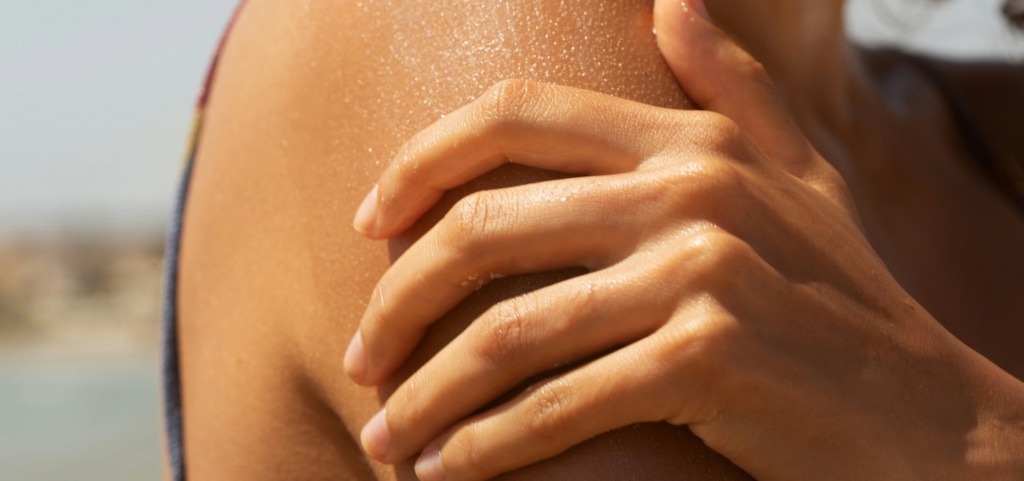
Stay clear of sunbeds and try spray tan
Avoid using sunbeds, sunlamps and tanning booths where possible. This is because, much like the sun, they emit high levels of ultraviolet radiation which can significantly increase your risk of skin cancer, including melanoma. Sunbeds can also cause premature skin aging, eye damage and weaken the immune system. Even occasional use can be harmful. If you’re looking to tan, use fake tan or spray tan. These are much safer alternatives for your skin and general health.

